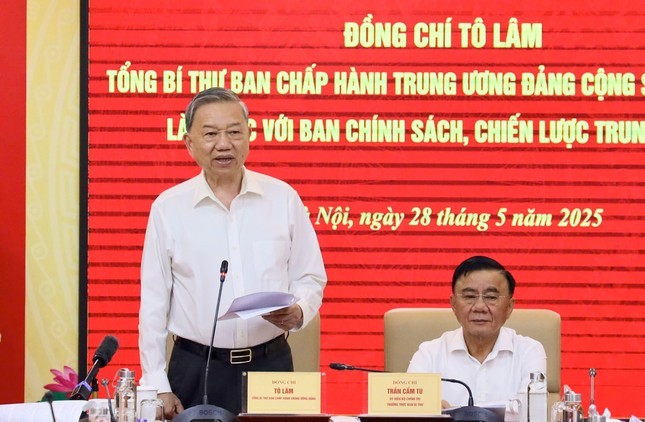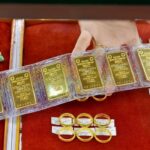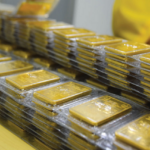General Secretary To Lam: Ending the State Monopoly on Gold Bars
On May 28, General Secretary To Lam met with the Central Committee for Policy and Strategy. At the meeting, Party Central Committee member and Head of the Central Committee for Policy and Strategy Tran Luu Quang presented a report evaluating and proposing mechanisms and policies for effective management of the gold market in the coming time.
Mr. Tran Luu Quang affirmed the viewpoint of the Central Committee for Policy and Strategy, which is to manage the gold market according to market principles with appropriate state management; eliminating the mindset that if something cannot be managed, it should be banned; respecting ownership, property rights, and freedom of business; and ensuring transparency in the market.
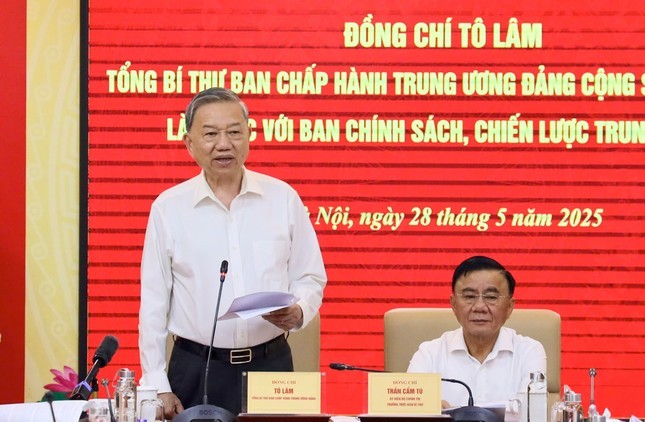
General Secretary To Lam speaks at the meeting. Photo: Central Committee for Policy and Strategy.
In his conclusion, General Secretary To Lam emphasized that the mechanisms and policies for managing the gold market in Vietnam in recent years have been positively adjusted and improved. However, it is also necessary to frankly acknowledge that the mechanisms and policies for managing and regulating the gold market have been slow to innovate and have not kept up with the market’s development and the demands of reality, and they need to be urgently renewed and improved.
Regarding tasks and solutions, the General Secretary first emphasized the need to improve the legal framework and quickly amend Decree 24/2012/NĐ-CP towards marketization with a roadmap and tight control; creating more effective connections between the domestic gold market and the international market.
Second, the state monopoly on gold bar brands should be eliminated in a controlled manner, on the principle that the state still manages gold bar production activities but can license qualified enterprises to participate in gold bar production to create a competitive environment, thereby diversifying supply sources and stabilizing prices.
Series of Violations at Gold Enterprises
According to the inspection conclusions of the State Bank of Vietnam, a series of enterprises have been found violating regulations in gold trading recently, including: Saigon Jewelry Company Limited (SJC), Bao Tin Minh Chau Jewelry Joint Stock Company, PNJ Joint Stock Company, and others.
According to the inspection conclusion on the observance of policies and laws in gold trading activities at Bao Tin Minh Chau Jewelry Joint Stock Company, the company violated regulations on reporting on gold bar trading activities; violated transactions by selling gold at a price higher than the listed price; and failed to publish on their website information about transportation and delivery.
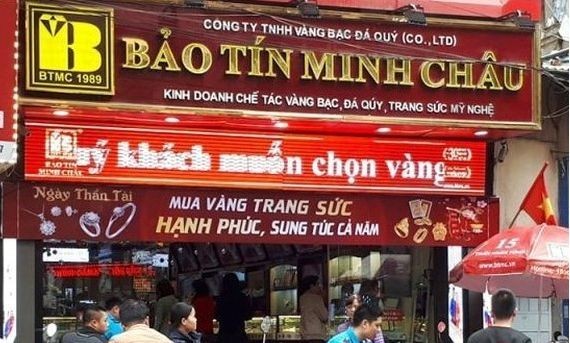
Bao Tin Minh Chau gold brand committed multiple violations according to the inspection conclusion.
Bao Tin Minh Chau also showed signs of providing misleading information about products and goods supplied by the enterprise to attract customers from other enterprises, relating to unfair competitive practices.
According to the inspection conclusion, Bao Tin Minh Chau also violated some provisions of the law on anti-money laundering activities by issuing internal regulations with incomplete content and not having a management system to identify foreign individual customers with political influence.
The State Bank of Vietnam’s inspection conclusion on the observance of policies and laws in gold trading activities at SJC Joint Stock Company found that the company violated regulations on reporting gold bar trading activities and showed signs of providing misleading information about products and goods supplied by the enterprise to attract customers from other enterprises, relating to unfair competitive practices.
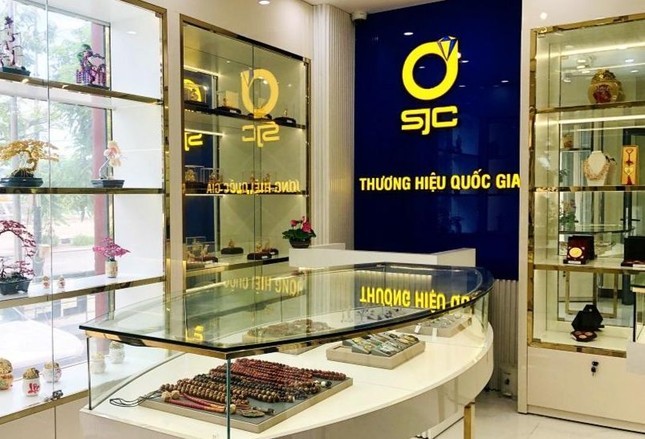
An SJC store.
Customer verification results showed signs of SJC violating tax regulations. Based on legal provisions, the State Bank of Vietnam has forwarded information to competent authorities for consideration and handling according to regulations.
Notably, the State Bank of Vietnam’s inspection conclusion stated that although there was no basis to determine that the price increase during the period from October 2, 2023, to April 15, 2024, was unreasonable, SJC’s price decisions were made by the company’s general director and under their direct instruction. This occurred without internal regulations or procedures on indicators and specific bases in the mechanism for determining prices, failing to separate the responsibilities of related departments in advising on price determination.
The inspection conclusion clearly stated that the decision-making power on gold buying and selling prices resting with a single individual, the general director, without specific indicators and bases, led to risks in price determination that affected SJC’s operations as well as the gold market, given SJC’s relatively large market share.
SJC was also found to have violated some provisions of the law on anti-money laundering.
CP Accused of Selling Unsafe Meat: Food Safety Certificate Expired
On May 31, the Department of Agriculture and Environment of Soc Trang province reported to the provincial People’s Committee the results of an impromptu inspection of a business location of CP Vietnam Livestock Joint Stock Company in the locality.
The inspection found that the company presented a photocopy of the business location registration and the original Food Safety Certificate issued by the Department of Quality Management of Agricultural, Forestry, and Aquatic Products, which had expired on March 8, 2025. In addition, the company failed to provide the original business registration certificate and certificates of food safety training for the owner and sales staff.
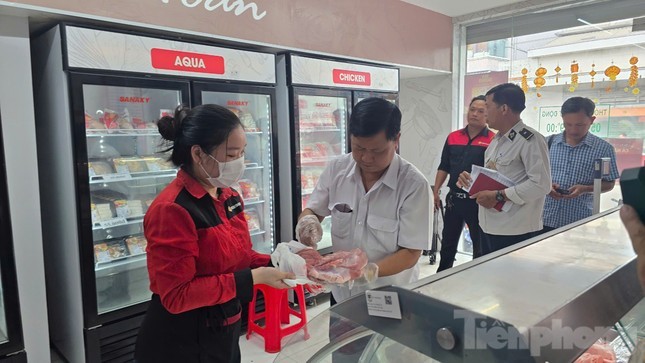
Leaders of the Department of Animal Husbandry and Veterinary of Soc Trang province directly inspect the products. Photo: Nhat Huy.
At the time of the inspection, the company was trading 43 animal product items, including nearly 51 kg of pork sourced from the abattoir in My Xuyen town, 780 fresh chicken eggs, and various processed meats such as sausages and pork rolls, as well as chicken meat imported from Binh Phuoc province. The inspection team confirmed that inter-provincial transported goods were accompanied by health certificates.
Previously, a post on social media from a Facebook account named L.Q.N. accused CP Vietnam Livestock Joint Stock Company of violating food safety regulations.
Mr. N. stated that he used to be an employee at the company’s food store on Trieu Nuong Street (My Xuyen town). In the post, Mr. N. claimed that the company mixed sick and rotten pork and chicken and forced employees to sell them to the market. Some poor-quality products were allegedly separated and sold at half price to local people for making sausage and sausage; expired products had their labels removed for consumption.
“Those pieces of sick and rotten pork and chicken looked terrible, with lumps, boils, pus, and even a putrid smell, yet they were still sent to the store. Sometimes, we were asked to separate and sell them at half price to local people. For expired sausages, the labels were removed, and they were made into fried pork rolls…”, Mr. N. wrote.
After Two Days of Negotiation, Frozen Durian from Vietnam Enters China
On May 30, a batch of 22 tons of frozen durian produced by Vina M&B Export and Trading Limited Company (Hanoi) was officially cleared through the Bac Luan II border gate, belonging to the Mong Cai (Vietnam) – Dongxing (China) border gate pair. The importing company in China is Shanghai Xinronghe International Trade Co., Ltd., based in Shanghai.
This event took place just two days after a direct working session between the Minister of Agriculture and Environment of Vietnam, Mr. Do Duc Duy, and Ms. Sun May Jun, the General Administrator of the General Customs Administration of China, on May 28.
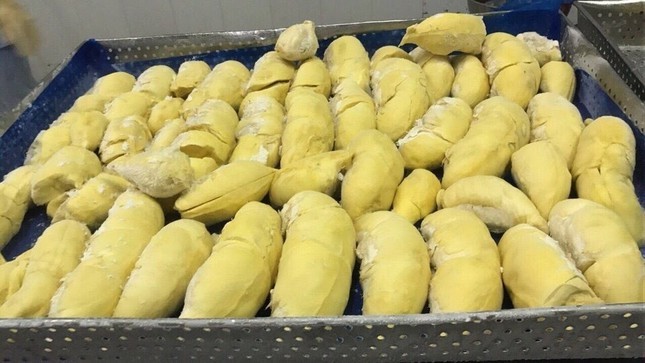
Frozen durian can be stored for longer, and its quality is maintained during long-distance transportation. Illustration: IT.
This batch of frozen durian was produced following a strict process, from raw material traceability to processing, freezing, packaging, and finished product testing. Every step had to meet the regulations and technical standards according to the Protocol signed by the two countries in August 2024. This is not only a technical requirement but also a commercial commitment demonstrating the professionalism and determination to expand the market for Vietnamese agricultural products.
The successful export of this batch of frozen durian marks a notable turning point in the context of challenges in exporting fresh durian, especially in quality control and transportation time.
Vinashinlines Officially Bankrupt
The People’s Court of Hanoi has issued a decision declaring the Vietnam Ocean Shipping Joint Stock Company (Vinashinlines) bankrupt as of May 5, 2025.
On August 19, 2015, the legal representative of Vinashinlines submitted a request for bankruptcy proceedings.

Vinashinlines will be bankrupt from May 5. Photo: Vinashinlines.
At the creditors’ meeting on November 23, 2024, the creditors voted to approve the proposal to declare the company bankrupt. Therefore, Vinashinlines has ceased operations since May 5.
According to the Hanoi People’s Court’s decision to declare Vinashinlines bankrupt, the company’s secured debts will be temporarily handed over to the Vietnam Maritime Corporation (VIMC) to manage the mortgaged assets.
The mortgagees, including the Bank for Investment and Development of Vietnam (BIDV), the Vietnam Development Bank (VDB), the Financial Leasing Company No. 2 – Vietnam Industrial Maritime Bank (VSFC), and the Vietnam Shipbuilding Industry Corporation (SBIC), are obliged to take over the mortgaged assets and dispose of them to recover the debts.
The handling plan includes re-evaluating the assets, selling them at auction to repay the secured debts. If the value of the mortgaged assets is insufficient to repay all secured debts, the remaining debt will become unsecured debt.
‘Deregulation of Gold Doesn’t Mean a Free-for-All or a Return to Chaos’
“The exclusive mechanism for SJC gold bullion over a decade ago was appropriate for the conditions at the time. However, it is no longer reasonable today. We should not allow a single enterprise or organization to monopolize the gold bullion market. It is important to emphasize that ending this monopoly does not mean leaving the market unregulated or returning to the chaotic period before Decree 24,” said National Assembly deputy Trinh Xuan An (from Dong Nai delegation) on May 29.
What’s the Deal with SJC’s Monopoly on Gold Bars Over the Past Decade?
In 2024, the volatile gold prices resulted in a significant revenue shift for SJC. The company raked in 32,193 billion VND, marking a notable surge of nearly 4,000 billion VND compared to 2023. This performance is especially noteworthy considering SJC’s previous monopoly on gold bullion, during which it boasted revenues surpassing 72,000 billion VND.
“Allegations of Selling Contaminated Meat: Authorities Investigate CP Vietnam”
“In a recent development, Tran Van Lau, the People’s Committee Chairman of Soc Trang province, has directed the police to investigate and clarify information regarding allegations of ‘selling dirty meat’ against CP Vietnam Livestock Joint Stock Company. The authorities are taking these claims seriously and have initiated a thorough probe into the matter.”

